2018_2019学年高中英语module3adventureinliteratureandthecinemareading句型篇课时作业外研版必修5
- 格式:doc
- 大小:50.50 KB
- 文档页数:5
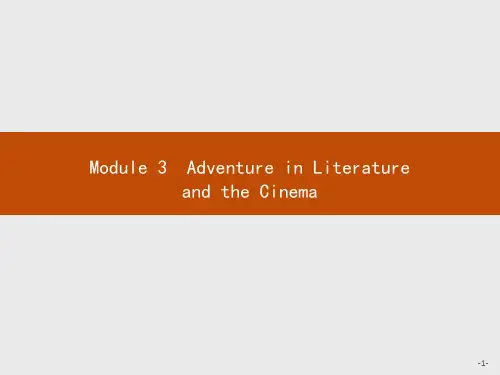

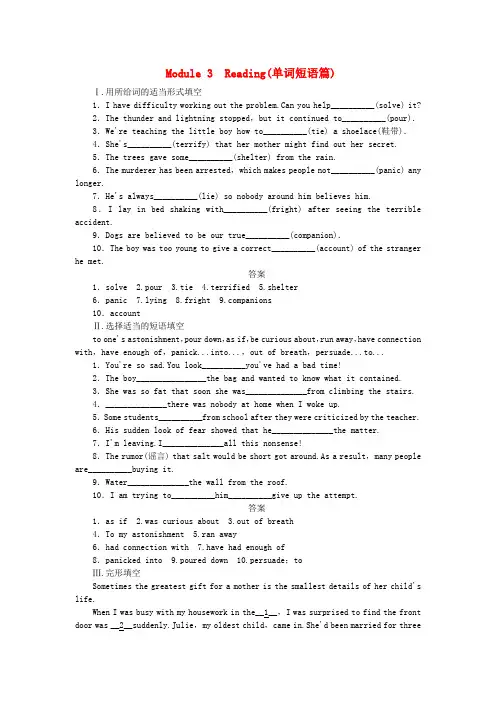
Module 3 Reading(单词短语篇)Ⅰ.用所给词的适当形式填空1.I have difficulty working out the problem.Can you help__________(solve) it?2.The thunder and lightning stopped,but it continued to__________(pour).3.We're teaching the little boy how to__________(tie) a shoelace(鞋带).4.She's__________(terrify) that her mother might find out her secret.5.The trees gave some__________(shelter) from the rain.6.The murderer has been arrested,which makes people not__________(panic) any longer.7.He's always__________(lie) so nobody around him believes him.8.I lay in bed shaking with__________(fright) after seeing the terrible accident.9.Dogs are believed to be our true__________(companion).10.The boy was too young to give a correct__________(account) of the stranger he met.答案1.solve 2.pour 3.tie 4.terrified 5.shelter6.panic 7.lying 8.fright panions10.accountⅡ.选择适当的短语填空to one's astonishment,pour down,as if,be curious about,run away,have connection with,have enough of,panick...into...,out of breath,persuade...to...1.You're so sad.You look__________you've had a bad time!2.The boy________________the bag and wanted to know what it contained.3.She was so fat that soon she was______________from climbing the stairs.4.______________there was nobody at home when I woke up.5.Some students__________from school after they were criticized by the teacher.6.His sudden look of fear showed that he______________the matter.7.I'm leaving.I______________all this nonsense!8.The rumor(谣言) that salt would be short got around.As a result,many people are__________buying it.9.Water______________the wall from the roof.10.I am trying to__________him__________give up the attempt.答案1.as if 2.was curious about 3.out of breath4.To my astonishment 5.ran away6.had connection with 7.have had enough of8.panicked into 9.poured down 10.persuade;toⅢ.完形填空Sometimes the greatest gift for a mother is the smallest details of her child's life.When I was busy with my housework in the__1__,I was surprised to find the front door was __2__suddenly.Julie,my oldest child,came in.She'd been married for threemonths.I was still trying to get used to her__3__elsewhere.Sometimes I even set her place at the table without__4__.Julie handed me a small bunch of daffodils(黄水仙) and said,“Guess what!”__5__she opened the box on the table and bent to see what was inside.As I put the flowers in__6__,I answered happily,“What?”She began telling me some small__7__of her new life as she made herself a sandwich.She'd learned to make cakes by herself,and her boss was__8__with her because of her hard work.We sat at the kitchen table,and I__9__her eat,listening to her every word__10__.It was a short visit.Julie had to go to work.I thanked her__11__the flowers and her visit;then I walked to the door with her and__12__as she drove out of the yard.__13__in the kitchen I sat and looked at the flowers.My daughter's__14__was as bright and dear as the__15__spring daffodils.Suddenly,I__16__the phone and dialed(拨) my own mother's number.She lived one hundred miles away.When she__17__it,I said,“Guess what!”“What?” she answered hopefully.Like Julie I didn't have any__18__news,just little details of the day and the children,__19__I'd come to understand in the last hour how valuable a small talk can be.Just before I hung__20__,my mother said,“You made my day.”1.A.kitchen B.bedroomC.study D.sitting room2.A.closed B.openedC.raised D.dropped3.A.studying B.playingC.living D.appearing4.A.feeling B.seeingC.listening D.thinking5.A.though B.onceC.if D.as6.A.water B.foodC.blood D.air7.A.jokes B.experimentsC.details D.memories8.A.full B.sureC.ashamed D.satisfied9.A.let B.watchedC.had D.made10.A.safely B.bravelyC.happily D.strangely11.A.to B.forC.in D.with12.A.stayed B.wavedC.sang D.cried13.A.Further B.NearbyC.Up D.Back14.A.visit B.tripC.greeting D.smile15.st B.nextC.early D.late16.A.picked out B.picked upC.made out D.made up17.A.answered B.saidC.replied D.thought18.A.good B.badC.small D.big19.A.so B.orC.but D.and20.A.on B.upC.back D.out答案与解析本文主要告诉我们要常回家看看,和母亲讲讲生活中的一些琐事就是给母亲最好的礼物。
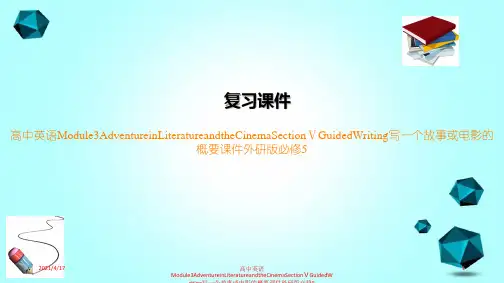
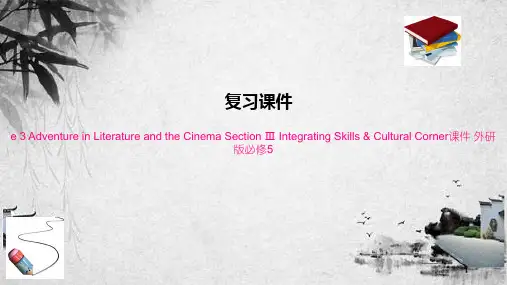
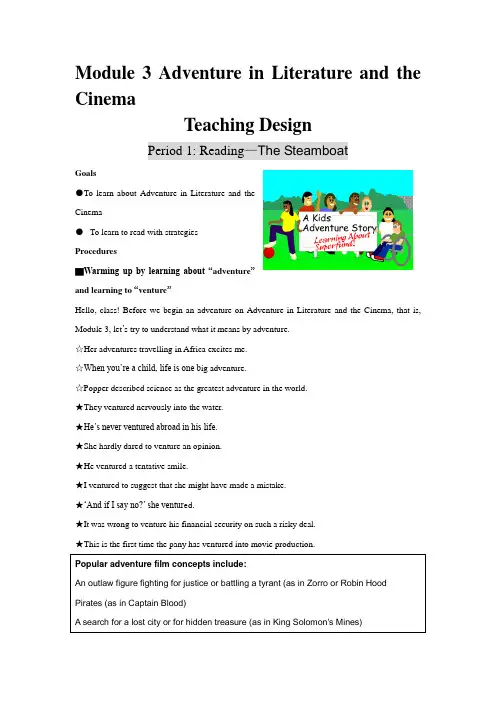
Module 3 Adventure in Literature and the CinemaTeaching DesignPeriod 1: Reading—The SteamboatGoals●To learn about Adventure in Literature and theCinema●To learn to read with strategiesProcedures▇Warming up by learning about “adventure”and learning to “venture”Hello, class! Before we begin an adventure on Adventure in Literature and the Cinema, that is, Module 3, let’s try to understand what it means by adventure.☆Her adventures travelling in Africa excites me.☆When you’re a child, life is one b ig adventure.☆Popper described science as the greatest adventure in the world.★They ventured nervously into the water.★He’s never ventured abroad in his life.★She hardly dared to venture an o p inion.★He ventured a tentative smile.★I ventured to suggest that she might have made a mistake.★‘And if I say no?’ she ventur e d.★It was wrong to venture his financial security on such a risky deal.★This is the first time the pany has ventured into movie production.■Warming up by imaging going on an adventureBoys and girls, what is adventure?Adventure is an exciting trip. If you are bored, you couldimagine going on a great adventure.Have a go at caving, climbing, sailing and canoeing atAdventure Club during the summer vocation.All the activities at Adventure Club are run and supervised byqualified and experienced staffAdventure Club started life in the 1970s as a sailing club foryoung people. Since this time it has grown and grown.Adventure Club now provides over 10,000 sessions of adventure to young people each year. Would you like to go? Then e with me!▇Before you readPlease go over the word list for this module, paying attention to the pronunciation of the word, the relationship between its pronunciation and its spelling.▇While you readCut/ the sentences into thought groups, blacken the predicates, underline the useful expressions and darken the connectives.▇After you readCopy all the useful expressions into your Expression Book and make your own sentences with them.■Read to transfer informationYou are to read the text once again to plete the table with necessary information from it.■Closing down by learning about steamboatsA steamboat or steamship, sometimes called a steamer, is a boat or vessel that is propelled by steam power driving a propeller or paddlewheel. The term steamboat is usually used to refer to smaller steam-powered boats working on lakes and rivers, particularly riverboats in the USA; steamship generally refers to steam powered shipscapable of carrying a (ship's) boat. Nuclearpowered ships and submarines use steam todrive turbines, but are not referred to assteamships or steamboats.Screw-driven steamships generally carry the ship prefix "SS" before their names, or "TS" where powered by a steam turbine. Paddle steamers have the prefix "PS". The term steamer is occasionally used, out of nostalgia, for diesel motor driven vessels, prefix "MV".Period 2: Grammar—Review of verb forms (3)Goals●To review ~ing form, the ~ed form and to + infinitive; link verbsProcedures▇Review ~ing form, the ~ed form and to + infinitive; link verbsIt is very mon to use strings of verbs - where two verbs are used in sequence. For example, the verb want is monly used in this way:I want to go home.verb 1 verb 2Only the first verb in the string is finite (has tense and subject-verb agreement). Thesecond verb must be in a non-finite form, and this can be difficult for learners as there is more than one non-finite form of the verb which can be used. monly the form used is to + infinitive, as in the example above. However, there are some mon verbs which require the -ing (present participle) form of the verb to be used in the second verb, instead of the base form. For example, the verb enjoy is monly used in this way:She enjoys dancing.verb 1 verb 2There are also some verbs such as stop which can be used in both patterns, but with different meanings. (we shall study these in the next lesson).Here is a list of some of the mon verbs used only in the pattern:verb 1 (finite) + verb 2 (-ing form)Verbs followed by the -ing formHere is a list of some of the mon verbs used only in the pattern:verb 1 (finite) + verb 2 (to + infinitive)Verbs followed by to + infinitive■Exercise: -ing or to + infinitive?In this exercise you select which is the best form of the verb to use - the -ing form or to + infinitive..1. Hello John. Fancy (to meet/ meeting) you here.2. Hello John. I didn't expect (finding/ to find) you here.3. I haven't decided (accepting/ to accept) the job yet. I want (knowing/ to know) a bit more about it.4. The students seemed (understanding/ to understand) but I'm not sure if they did.5. You must practise (to speak/ speaking) English as much as you can, and don't miss (to go/ going ) to the lessons.6. He admitted (to break in/ breaking in) to the house, but denied (to kill/ killing) the occupant.7. Don't keep (to tap/ tapping) your fingers on the table - it's very annoying.8. He decided (postponing/ to postpone) the visit again, but if he puts off (to visit/ visiting) us much longer then I'm (to go/ going) to cancel the deal.9. You have to learn (using/ to use) these difficult verbs.10. When she wouldn't agree (marrying/ to marry) him he threatened (mitting/ to mit) suicide.11. They suggested (to go/ going) to a Chinese restaurant but he wanted (eating/ to eat) Western food.12. There is a very delicious fish which people like (eating/ to eat) even though they risk (to get/ getting) poisoned.13. Everyone remended (to stay/ staying) in that hotel but it was full. But we managed (finding/ to find) a nice room in a hotel nearby.14. They don't permit (to smoke/ smoking) on the ferry although passengers tend (ignoring/ to ignore) the rule.15. She missed (to pass/ passing) the oral test by only 2 marks, although she hopes to (making up/ make up) the difference in the writing.(Keys: 1. meeting 2. to find 3. to accept, to know 4. to understand 5. speaking, going 6. breaking in, killing 7. tapping 8. to postpone, visiting, going 9. to use 10. to marry, to mit 11. going, to eat 12. to eat, getting 13. staying, to find, 14. smoking, to ignore 15. passing, make up)Period 3: SpeakingGoalsTo tell the class what film you would like to see, and why●Procedures▇Warming up by learning about what is filmHello, class. Today we shall talk about film. I know that you are all fond of films, but what do you know about them?Film is a term that enpasses motion pictures as individual projects, as well as the field in general. The origin of the name es from the fact that photographic film (also called filmstock) has historically been the primary medium for recording and displaying motion pictures. Many other terms exist — motion pictures (or just pictures), the silver screen, photoplays, the cinema, picture shows, flicks — and most monly movies."Film" refers to the celluloid media on which movies are printed. Films are produced by recording actual people and objects with cameras, or by creating them using animation techniques and/or special effects. They prise a series of individual frames, but when these images are shown rapidly in succession, the illusion of motion is given to the viewer. Flickering between frames is not seen due to an effect known as persistence of vision —whereby the eye retains a visual image for a fraction of a second after the source has been removed. Perhaps of more relevance is what causes the perception of motion — a psychological effect identified as beta movement.Film is considered by many to be an important art form; films entertain, educate, enlighten and inspire audiences. The visual elements of cinema need no translation, giving the motion picture a universal power of munication. Any film can bee a worldwide attraction, especially with the addition of dubbing or subtitles that translate the dialogue. Films are also artifacts created by specific cultures, which reflect those cultures, and, in turn, affect them.■Telling the class what film you would like to see, and whyA: I’d like to see United 93, because the shock and awe of the September 11 attacks arerevisited in this painstaking recreation of the last flight of one of the doomed aircraft.B: For me The King is the best film I have ever seen. A young man leaves the navy to search for a father he's never met and, upon finding him, begins a romance with his young daughter. It is interesting.C: I think the Top 10 Chinese Martial Arts Movies are worth seeing. They are the top 10 picks of Chinese martial arts movies.A: Tell us more about them, would you?C: All right. The first is The Chinese Connection. It came out in 1972. It was directed by Lo Wei and starred by Bruce Lee. I think you have heard of this great man.D: I know that it was original titled as Fist of Fury.C: You are well informed. This movie is Bruce Lee's classic. If you want to see Bruce Lee's action, this is the one.B: What about the second on the list?C: It is Enter the Dragon, shot in 1973, directed by Robert Clouse and starring Bruce Lee. This is Bruce Lee's most popular movie.D: The third one is Drunken Master, made in 1979, and directed by Yuen Woo-Ping and starring Jackie Chan.C: That is the movie which made Jackie Chan a star. It is an entertaining film, yet not too violent.E: What do you think of The Shaolin Temple?C I like it. It is the fourth on the list, and made in 1982. It is directed by Chang Hsin-Yen and starring Jet Li. This is Jet Li's first film. Jet Li was the all-round wushu champion (martial arts) at that time (about 1982). Thus if you want to see the real thing, just see Jet Li in this movie.A: I like the fifth one called Snake in the Monkey's Shadow. It was made in 1982, and directed by Sum Cheung and starring John Chang. I think it is the best martial arts movie on the monkey style, snake style, and drunken style.C: I like No. 6. It is Shaolin Master Killer. It turned out in 1983. And it is directed by Lau Kar-Leung and starring Gordon Liu. I have seen it three times because it is, as by Movie Summary, "One of the most revered martial arts films of all time, this is the story of ayoung man who joins the Shaolin Temple when the Manchus kill his family."E: Chinese Martial Arts Movies are my favorites, too. I like to see Supercop once again. It seems to be the seventh on the list of the Top Ten Chinese Martial Arts Movies. It was first shown in 1992. And I believe it is directed by Stanley Tong and starring Jackie Chan, Michelle Yeoh. The film displays Chan's dual mastery of physical edy and martial arts while also showcasing his notorious predilection for handling his own stunts."A: I think Fist of Legend is good, too. It came out in 1994, and was directed by Gordon Chan and starring Jet Li. It is said that Fist of Legend is the best movie by Jet Li. This is a remake of Bruce Lee's The Chinese Connection.C: We are really fans of martial arts movies. Let’s go and see them after school!■Reading about Master and manderPlot Summary for Master and mander: The Far Side of the World(2003)During the Napoleonic Wars, a British frigate, HMS Surprise, and amuch larger French warship, the Acheron, with greater fire power, stalkeach other off of the coast of South America. Russell Crowe brings greatintensity to the role of Captain Jack Aubrey. Lucky Jack, as he is referred to by his crew, is well regarded by his men, who trust him implicitly, even after the first devastating battle and an apparent personal vendetta against the French captain. While the naval battle sequences are quite fantastic, the film is successful because director Weir chose to build the story to get to know the men who are locked aboard the tight quarters of a small ship and how they interact everyday. The officers and the mates are well-known by the time the final battle es. Paul Bettany offers a strong performance as the surgeon and naturalist who balances the violence of his chosen life with the quiet demeanor of the scientist. He is the captain's friend and confidant, the two frequently playing violin and cello duets together. The horrors of the injuries from the war are frequently implied, but vividly depicted in the reactions of the characters.■Closing down by retelling the story of Master and manderDuring the Napoleonic Wars, Lucky Jack Aubrey captains the crew of his H.M.S. Surprise. When the ship is suddenly attacked by a superior enemy, it is badly damaged and much of his crew is injured. In a bold and dangerous move, Aubrey decides to set sail in a high stakes chase across two oceans to intercept and capture their foe. It's a mission that can decide the fate of a nation--or destroy Lucky Jack and his crew.Period 4: FUNCTION—Reporting statements and suggestionsGoalsTo learn to report statements and suggestionsProcedures▇Warming up by learning about r eported speech - indirect speechIndirect Speech (also referred to as 'reported speech') refers to a sentence reporting what someone has said. It is almost always used inspoken English.He said, "I live in Paris." He said he lived in Paris.He said, "I am cookingdinner."He said he was cooking dinner.He said, "I have visted London twice."He said he had visited London twice.He said, "I went to New York last week."He said he had gone to New York the week before.He said, "I had alreadyeaten."He said he had already eaten.He said, "I am going to find a new job."He said he was going to find a new job.He said, "I will give Jack acall."He said he would give Jack a call.■municating with direct and indirect speech●If the reporting verb (i.e. said) is in the past, the reported clause will be in a past form. This form is usually one step back into the past from the original.For example:He said the test was difficult.She said she watched TV every day.Jack said he came to school every day.●If simple present, present perfect or the future is used in the reporting verb (i.e. says) the tense is retained.For example:He says the test is difficult.She has said that she watches TV every day.Jack will say that he es to school every day.●If reporting a general truth the present tense will be retained.For example:The teacher said that phrasal verbs are very important.●Changing Pronouns and Time SignifiersWhen changing from direct speech to indirect speech, it is often necessary to change the pronouns to match the subject of the sentence.For example:She said, "I want to bring my children." BEES She said she wanted to bring her children.Jack said, "My wife went with me to the show." BEES Jack said his wife had gone with him to the show.●It is also important to change time words (signifiers) when referring to present, past or future time to match the moment of speaking.For example:She said, "I want to bring my children tomorrow." BEES She said shewanted to bring her children the next day.Jack said, "My wife went with me to the show yesterday." BEES Jack said his wife had gone with him to the show the day before.●Indirect QuestionsWhen reporting questions, it is especially important to pay attentionto sentence order. When reporting yes/ no questions connect the reported question using 'if'. When reporting questions using question words (why, where, when, etc.) use the question word.For example:She asked, "Do you want to e with me?" BEES She asked me if I wanted to e with her.Dave asked, "Where did you go last weekend?" BEES Dave asked me where I had gone the previous weekend.He asked, "Why are you studying English?" BEES She asked me whyI was studying English.■Closing down by making a summary of Reporting statements and suggestionsVERB TENSEWH- QUESTIONCHANGEPRESENT PASTMy friend "How are you?" My friend asked how Isaid, was.PRESENTPROGRESSIVEPAST PROGRESSIVEMy friend said,"Where are yougoing?"My friend asked whereI was going.PAST PAST PERFECTMy friendsaid, " Whom did you call?"My friend asked whomI had called.PAST PROGRESSVEPAST PERFECTPROGRESSVEMy friend said," Whom I wascalling?"My friend asked whomI had been calling.PRESENT PERFECT PAST PERFECTMy friend said," Where have youbeen?"My friend asked whereI had been.PRESENT PERFECTPROGRESSVEPAST PERFECTPROGRESSVEMy friend said," How have you beendoing?"My friend asked how Ihad been doing.PRESENT - GENERAL TRUTHPRESENT - GENERAL TRUTHMy friendsaid, "Where is Venus?"My friend asked whereVenus is.Period 5: WritingGoals●To learn to read and write summaries of filmsProcedures▇Warming up by glancing over The Adventures of Huckleberry Finn哈克贝里·芬历险记第01章教哈克学文明规矩——华珍小姐——汤姆·索亚在等候第02章两个孩子逃过了杰姆的搜寻——汤姆·索亚的帮伙——精心作出的计划第03章全身查看了一遍——主日得胜——“汤姆·索亚的一次谎话”第04章哈克与法官——迷信第05章哈克的父亲——好父亲——改造第06章他控告法官撒切尔——哈克决定要出走——政治经济学言论——折腾第07章守候着他——给锁在木屋里——把尸体沉下去——歇息第08章睡在林子里——打捞起死者——察勘全岛——发现了杰姆——杰姆的出逃——预兆第09章山洞——漂流的屋子第10章发现——“老汉克·朋格”——男扮女装第11章哈克和村妇——搜捕——支吾搪塞——去高申第12章缓慢的航行——借东西——上破船——歹徒——搜寻小船第13章逃出破船——守夜人——沉没第14章快活的时光——后宫——法语第15章哈克丢了木筏子——雾中——哈克找回了木筏子——垃圾第16章期待——一次没有恶意的谎话——漂来的钱财——错过开罗——往岸边游去第17章章黄昏时叫门——阿肯色的田庄——室内陈设——斯蒂芬·道林·博茨——诗兴第18章格伦基福特上校——贵族门第——打冤家——《新约全书》——收回了木筏子第19章白天停靠——一个天文学说——重振戒酒运动——勃里奇华特公爵——王室遭难第20章哈克作解释——策划一次战役——到野营会上施展一番——野营会上的一名海盗第21章斗剑操练——哈姆雷特独白——他们在镇上四处蹓跶——一个懒散的市镇第22章歇朋——看马戏——在马戏场里发酒疯——惊心动魄的悲剧第23章上当——拿国王跟国王比——杰姆想家心切第24章披了王袍的杰姆——他们收了个乘客——打听情况——一家人的悲痛第25章“是他们么?”——唱颂歌——光明正大——殡葬酒宴——投错了资第26章一位虔诚的国王——国王的教士——她向他赔不是——在房间里躲起来第27章葬仪——满足好奇心——对哈克起了疑心——薄利快销第28章准备去英国——“这畜牲”——玛丽·珍妮决计离家——哈克分别玛丽·珍妮第29章争当家属——国王对丢钱作了解释——笔迹问题——把尸体从墓中挖出来第30章国王和他闹开了——国王勃然大怒——烂醉如泥第31章凶险的策划——来自杰姆的消息——回忆往事——一头羊的故事——宝贵的信息第32章静悄悄象过星期天一般——认错了人——露马脚——进退两难。
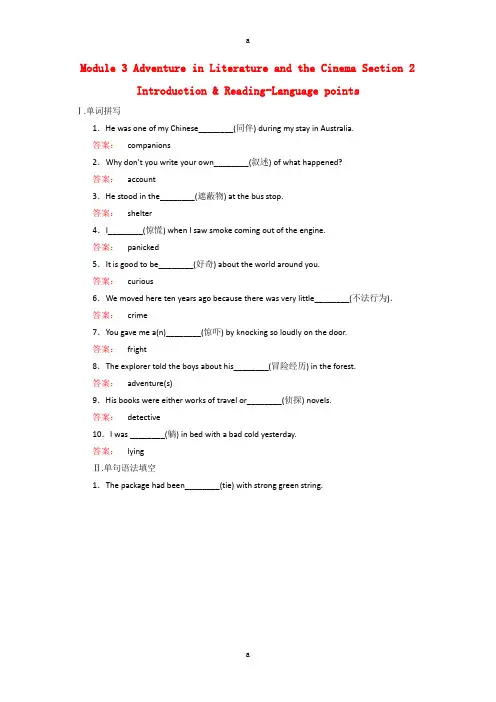
Module 3 Adventure in Literature and the Cinema Section 2 Introduction & Reading-Language pointsⅠ.单词拼写1.He was one of my Chinese________(同伴) during my stay in Australia.答案:companions2.Why don’t you write your own________(叙述) of what happened?答案:account3.He stood in the________(遮蔽物) at the bus stop.答案:shelter4.I________(惊慌) when I saw smoke coming out of the engine.答案:panicked5.It is good to be________(好奇) about the world around you.答案:curious6.We moved here ten years ago because there was very little________(不法行为).答案:crime7.You gave me a(n)________(惊吓) by knocking so loudly on the door.答案:fright8.The explorer told the boys about his________(冒险经历) in the forest.答案:adventure(s)9.His books were either works of travel or________(侦探) novels.答案:detective10.I was ________(躺) in bed with a bad cold yesterday.答案:lyingⅡ.单句语法填空1.The package had been________(tie) with strong green string.答案:tied2.He was badly injured,________(lie) on the ground,unable to stand up.答案:lying3.It was________(pour) with rain at three o’clock.答案:pouring4.The protests became more violent and many people were________(panic) into leaving the country.答案:panicked5.The________(murder) was arrested and put to death at last.答案:murderer6.Seeing the ________sight,I was nearly________to death.(fright)答案:frighting;frightenedⅢ.选词填空get into a panic,be curious about,have connection with,as if,to our astonishment,give a clear account of,run away1.She looks____________________she were ten years younger.答案:as if2.Some____________________the case,while others____________________.答案:were curious about;got into a panic3.____________________,they owe such a big house.答案:To our astonishment4. Someone____________________what he had seen.答案:gave a clear account of5.They were worried that someone near them __________________the case.答案:had connection with6.A girl was killed in the park.And the murderer____________________.答案:ran awayⅣ.完形填空As I entered womanhood,Mom told me that no matter what happened and no matter what I did,I could always come home.Because of what those words meant to me,I said the same thing to my__1__.My childhood was filled with__2__—lots of kisses,lots of hugs,and lots of spoken “I love you”.Because of what those meant to me,I__3__my sons the same things.My mom came from a__4__family and had a difficult childhood,yet she never__5__about how unlucky she was.__6__my mom,I saw love’s ability to forgive.I saw my sweet mom love my grandpa,__7__he had abandoned (遗弃) her and my grandma and failed to__8__for their needs.I never saw Mom treat Grandpa any way but lovingly,even though he was far from__9__.I learned how love behaves and forgives.I watched my mom__10__my 100-year-old grandma who,in her blindness,deafness and feebleness (虚弱),needed almost__11__care.When I was in her home,I heard what I’ve heard all my life,“I love you,Mom.” They would__12__each other this at least five times a__13__—when Mom got Grandma up,made her comfortable in bed,or prepared her__14__.And I would hear love’s__15__when Grandma said,“And I love you,too.”Love forgives and__16__,not focusing on what has happened.__17__,love’s focus is on what needs to be done now and on doing it the__18__we can.My mom taught me to love;she taught me to__19__it on to my children,and she__20__forgiveness herself.语篇解读作者从妈妈的身上懂得了爱的真谛,同样作者也把爱传递给了自己的孩子。
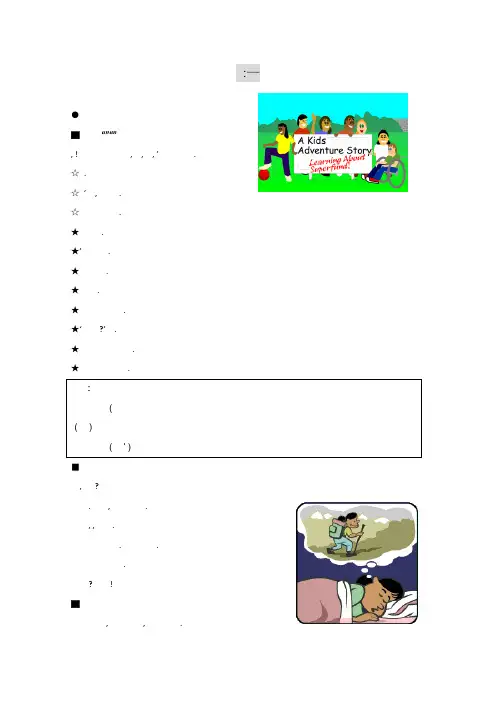
:—●▇“”“”, ! , , , ’.☆.☆’, .☆.★.★’.★.★.★.★‘?’.★.★.■, ?. , ., , .. ..? !▇, , .▇, , .▇..■, , . , ; (') . , ."" , "" . "". , , , "".’: —()●, ;▇, ;. , :.( ). , . , . , ( ) , . , :.:() ( ): Array() ( )■: ?... . ( ) .. . ' ( ) .. ' () . () .. () ' .. ( ) , ' ( ) .. ( ) , ( ) .. ' ( ) ' .. () , ( ) ' ( ) .. () .. ' () () .. ( ) () .. () ( ) .. ( ) . () .. ' ( ) () .. ( ) , ( ) .(: . . , . . , . , . . , , . , . , , . , , . , . , ):,▇, . ( ) . —( ), , , , , — ."" . , . , , . — . — .; , , . , . , . , , , , .■,: ’, .: . ' , , . .: . .: , ?: . . . . .: .: . ' . ' , .: ?: , , ' .: , , .: . , .: ?. ,. ' . ( ) ( ). , .: ' . , . , , .: . . . . . , , " , .": , . . . . , ' .": , . , . . ' .: . ’!■: (), , , , , , . . , , , ,. , . .. ' , . , .■, . . , . , . ' .: —▇( ' ') . ., " ." ., " ." ., " ." ., " ." ., " ." ., " ." ., " ." .■●(. ) , . .:...●, (. ) .:...● .:.●, .:, " ." ., " ." .●() , .:, " ." ., " ." .●, . ''. (, , , .) .:, " ?" ., " ?" ., " ?" .■, " ?" ., " ?" . , " ?" . , " ?" . , " ?" . , " ?" ., " ?" . :▇哈克贝里·芬历险记第章教哈克学文明规矩——华珍小姐——汤姆·索亚在等候第章两个孩子逃过了杰姆的搜寻——汤姆·索亚的帮伙——精心作出的计划第章全身查看了一遍——主日得胜——“汤姆·索亚的一次谎话”第章哈克与法官——迷信第章哈克的父亲——好父亲——改造第章他控告法官撒切尔——哈克决定要出走——政治经济学言论——折腾第章守候着他——给锁在木屋里——把尸体沉下去——歇息第章睡在林子里——打捞起死者——察勘全岛——发现了杰姆——杰姆的出逃——预第章发现——“老汉克·朋格”——男扮女装第章哈克和村妇——搜捕——支吾搪塞——去高申第章缓慢的航行——借东西——上破船——歹徒——搜寻小船第章逃出破船——守夜人——沉没第章快活的时光——后宫——法语第章哈克丢了木筏子——雾中——哈克找回了木筏子——垃圾第章期待——一次没有恶意的谎话——漂来的钱财——错过开罗——往岸边游去第章章黄昏时叫门——阿肯色的田庄——室内陈设——斯蒂芬·道林·博茨——诗兴第章格伦基福特上校——贵族门第——打冤家——《新约全书》——收回了木筏子第章白天停靠——一个天文学说——重振戒酒运动——勃里奇华特公爵——王室遭难第章哈克作解释——策划一次战役——到野营会上施展一番——野营会上的一名海盗第章斗剑操练——哈姆雷特独白——他们在镇上四处蹓跶——一个懒散的市镇第章歇朋——看马戏——在马戏场里发酒疯——惊心动魄的悲剧第章上当——拿国王跟国王比——杰姆想家心切第章披了王袍的杰姆——他们收了个乘客——打听情况——一家人的悲痛第章“是他们么?”——唱颂歌——光明正大——殡葬酒宴——投错了资第章一位虔诚的国王——国王的教士——她向他赔不是——在房间里躲起来第章葬仪——满足好奇心——对哈克起了疑心——薄利快销第章准备去英国——“这畜牲”——玛丽·珍妮决计离家——哈克分别玛丽·珍妮第章争当家属——国王对丢钱作了解释——笔迹问题——把尸体从墓中挖出来第章国王和他闹开了——国王勃然大怒——烂醉如泥第章凶险的策划——来自杰姆的消息——回忆往事——一头羊的故事——宝贵的信息第章静悄悄象过星期天一般——认错了人——露马脚——进退两难。

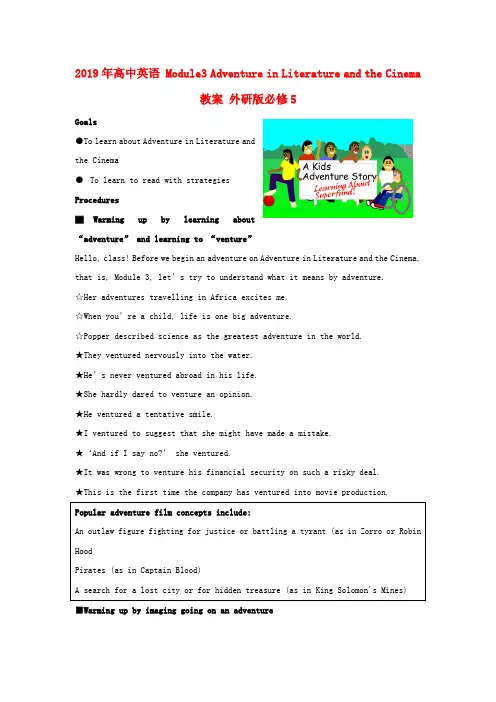
2019年高中英语 Module3 Adventure in Literature and the Cinema教案外研版必修5Goals●To learn about Adventure in Literature andthe Cinema●To learn to read with strategiesProcedures▇Warming up by learning about“adventure” and learning to “venture”Hello, class! Before we begin an adventure on Adventure in Literature and the Cinema, that is, Module 3, let’s try to understand what it means by adventure.☆Her adventures travelling in Africa excites me.☆When you’re a child, life is one big adventure.☆Popper described science as the greatest adventure in the world.★They ventured nervously into the water.★He’s never ventured abroad in his life.★She hardly dared to venture an opinion.★He ventured a tentative smile.★I ventured to suggest that she might have made a mistake.★‘And if I say no?’ she ventured.★It was wrong to venture his financial security on such a risky deal.★This is the first time the company has ventured into movie production.■Warming up by imaging going on an adventureBoys and girls, what is adventure?Adventure is an exciting trip. If you are bored, youcould imagine going on a great adventure.Have a go at caving, climbing, sailing and canoeingat Adventure Club during the summer vocation.All the activities at Adventure Club are run andsupervised by qualified and experienced staffAdventure Club started life in the 1970s as a sailingclub for young people. Since this time it has grown and grown.Adventure Club now provides over 10,000 sessions of adventure to young people each year.Would you like to go? Then come with me!▇Before you readPlease go over the word list for this module, paying attention to the pronunciation of the word, the relationship between its pronunciation and its spelling.▇While you readCut/ the sentences into thought groups, blacken the predicates, underline the useful expressions and darken the connectives.▇After you readCopy all the useful expressions into your Expression Book and make your own sentences with them.■Read to transfer informationYou are to read the text once again to complete the table with necessary information from it.■Closing down by learning about steamboatsA steamboat or steamship, sometimes called a steamer, is a boat or vessel that is propelled by steam power driving a propeller or paddlewheel. The term steamboat is usually used to refer to smaller steam-powered boats working on lakes and rivers,particularly riverboats in the USA;steamship generally refers to steam poweredships capable of carrying a (ship's) boat.Nuclear powered ships and submarines usesteam to drive turbines, but are notreferred to as steamships or steamboats.Screw-driven steamships generally carry the ship prefix "SS" before their names, or "TS" where powered by a steam turbine. Paddle steamers have the prefix "PS". The term steamer is occasionally used, out of nostalgia, for diesel motor driven vessels, prefix "MV".Period 2: Grammar—Review of verb forms (3) Goals●To review ~ing form, the ~ed form and to + infinitive; link verbs▇ Review ~ing form, the ~ed form and to + infinitive; link verbsIt is very common to use strings of verbs - where two verbs are used in sequence. For example, the verb want is commonly used in this way:I want to go home.verb 1 verb 2Only the first verb in the string is finite (has tense and subject-verb agreement). The second verb must be in a non-finite form, and this can be difficult for learners as there is more than one non-finite form of the verb which can be used. Commonly the form used is to + infinitive, as in the example above. However, there are some common verbs which require the -ing (present participle) form of the verb to be used in the second verb, instead of the base form. For example, the verb enjoy is commonly used in this way:She enjoys dancing.verb 1 verb 2There are also some verbs such as stop which can be used in both patterns, but with different meanings. (we shall study these in the next lesson).Here is a list of some of the common verbs used only in the pattern:verb 1 (finite) + verb 2 (-ing form)Verbs followed by the -ing formHere is a list of some of the common verbs used only in the pattern:verb 1 (finite) + verb 2 (to + infinitive)Verbs followed by to + infinitive■Exercise: -ing or to + infinitive?In this exercise you select which is the best form of the verb to use - the -ing form or to + infinitive..1. Hello John. Fancy (to meet/ meeting) you here.2. Hello John. I didn't expect (finding/ to find) you here.3. I haven't decided (accepting/ to accept) the job yet. I want (knowing/ to know)a bit more about it.4. The students seemed (understanding/ to understand) but I'm not sure if they did.5. You must practise (to speak/ speaking) English as much as you can, and don't miss (to go/ going ) to the lessons.6. He admitted (to break in/ breaking in) to the house, but denied (to kill/ killing) the occupant.7. Don't keep (to tap/ tapping) your fingers on the table - it's very annoying.8. He decided (postponing/to postpone) the visit again, but if he puts off (to visit/ visiting) us much longer then I'm (to go/ going) to cancel the deal.9. You have to learn (using/ to use) these difficult verbs.10. When she wouldn't agree (marrying/ to marry) him he threatened (committing/ to commit) suicide.11. They suggested (to go/ going) to a Chinese restaurant but he wanted (eating/ to eat) Western food.12. There is a very delicious fish which people like (eating/ to eat) even though they risk (to get/ getting) poisoned.13. Everyone recommended (to stay/ staying) in that hotel but it was full. But we managed (finding/ to find) a nice room in a hotel nearby.14. They don't permit (to smoke/ smoking) on the ferry although passengers tend (ignoring/ to ignore) the rule.15. She missed (to pass/ passing) the oral test by only 2 marks, although she hopes to (making up/ make up) the difference in the writing.(Keys: 1. meeting 2. to find 3. to accept, to know 4. to understand 5. speaking, going 6. breaking in, killing 7. tapping 8. to postpone, visiting, going 9. to use 10. to marry, to commit 11. going, to eat 12. to eat, getting 13. staying, to find, 14. smoking, to ignore 15. passing, make up)Period 3: SpeakingGoalsTo tell the class what film you would like to see, and why●Procedures▇ Warming up by learning about what is filmHello, class. Today we shall talk about film. I know that you are all fond of films, but what do you know about them?Film is a term that encompasses motion pictures as individual projects, as well as the field in general. The origin of the name comes from the fact that photographic film (also called filmstock) has historically been the primary medium for recording and displaying motion pictures. Many other terms exist —motion pictures (or just pictures), the silver screen, photoplays, the cinema, picture shows, flicks —and most commonly movies."Film" refers to the celluloid media on which movies are printed. Films are produced by recording actual people and objects with cameras, or by creating them using animation techniques and/or special effects. They comprise a series of individual frames, but when these images are shown rapidly in succession, the illusion of motion is given to the viewer. Flickering between frames is not seen due to an effect known as persistence of vision — whereby the eye retains a visual image for a fraction of a second after the source has been removed. Perhaps of more relevance is what causes the perception of motion — a psychological effect identified as betamovement.Film is considered by many to be an important art form; films entertain, educate, enlighten and inspire audiences. The visual elements of cinema need no translation, giving the motion picture a universal power of communication. Any film can become a worldwide attraction, especially with the addition of dubbing or subtitles that translate the dialogue. Films are also artifacts created by specific cultures, which reflect those cultures, and, in turn, affect them.■Telling the class what film you would like to see, and whyA: I’d like to see United 93, because the shock and awe of the September 11 attacks are revisited in this painstaking recreation of the last flight of one of the doomed aircraft.B: For me The King is the best film I have ever seen. A young man leaves the navy to search for a father he's never met and, upon finding him, begins a romance with his young daughter. It is interesting.C: I think the Top 10 Chinese Martial Arts Movies are worth seeing. They are the top 10 picks of Chinese martial arts movies.A: Tell us more about them, would you?C: All right. The first is The Chinese Connection. It came out in 1972. It was directed by Lo Wei and starred by Bruce Lee. I think you have heard of this great man. D: I know that it was original titled as Fist of Fury.C: You are well informed. This movie is Bruce Lee's classic. If you want to see Bruce Lee's action, this is the one.B: What about the second on the list?C: It is Enter the Dragon, shot in 1973, directed by Robert Clouse and starring Bruce Lee. This is Bruce Lee's most popular movie.D: The third one is Drunken Master, made in 1979, and directed by Yuen Woo-Ping and starring Jackie Chan.C: That is the movie which made Jackie Chan a star. It is an entertaining film, yet not too violent.E: What do you think of The Shaolin Temple?C I like it. It is the fourth on the list, and made in 1982. It is directed by Chang Hsin-Yen and starring Jet Li. This is Jet Li's first film. Jet Li was the all-round wushu champion (martial arts) at that time (about 1982). Thus if you want to see the real thing, just see Jet Li in this movie.A: I like the fifth one called Snake in the Monkey's Shadow. It was made in 1982, and directed by Sum Cheung and starring John Chang. I think it is the best martial arts movie on the monkey style, snake style, and drunken style.C: I like No. 6. It is Shaolin Master Killer. It turned out in 1983. And it is directed by Lau Kar-Leung and starring Gordon Liu. I have seen it three times because it is, as by Movie Summary, "One of the most revered martial arts films of all time, this is the story of a young man who joins the Shaolin Temple when the Manchus kill his family."E: Chinese Martial Arts Movies are my favorites, too. I like to see Supercop once again. It seems to be the seventh on the list of the Top Ten Chinese Martial Arts Movies. It was first shown in 1992. And I believe it is directed by Stanley Tong and starring Jackie Chan, Michelle Yeoh. The film displays Chan's dual mastery of physical comedy and martial arts while also showcasing his notorious predilection for handling his own stunts."A: I think Fist of Legend is good, too. It came out in 1994, and was directed by Gordon Chan and starring Jet Li. It is said that Fist of Legend is the best movie by Jet Li. This is a remake of Bruce Lee's The Chinese Connection.C: We are really fans of martial arts movies. Let’s go and see them after school! ■Reading about Master and CommanderPlot Summary for Master and Commander: The Far Side of the World(2003)During the Napoleonic Wars, a British frigate, HMS Surprise, anda much larger French warship, the Acheron, with greater fire power,stalk each other off of the coast of South America. Russell Crowebrings great intensity to the role of Captain Jack Aubrey. Lucky Jack, as he isreferred to by his crew, is well regarded by his men, who trust him implicitly, even after the first devastating battle and an apparent personal vendetta against the French captain. While the naval battle sequences are quite fantastic, the film is successful because director Weir chose to build the story to get to know the men who are locked aboard the tight quarters of a small ship and how they interact everyday. The officers and the mates are well-known by the time the final battle comes. Paul Bettany offers a strong performance as the surgeon and naturalist who balances the violence of his chosen life with the quiet demeanor of the scientist. He is the captain's friend and confidant, the two frequently playing violin and cello duets together. The horrors of the injuries from the war are frequently implied, but vividly depicted in the reactions of the characters.■Closing down by retelling the story of Master and CommanderDuring the Napoleonic Wars, Lucky Jack Aubrey captains the crew of his H.M.S. Surprise. When the ship is suddenly attacked by a superior enemy, it is badly damaged and much of his crew is injured. In a bold and dangerous move, Aubrey decides to set sail in a high stakes chase across two oceans to intercept and capture their foe. It's a mission that can decide the fate of a nation--or destroy Lucky Jack and his crew.Period 4: FUNCTION—Reporting statements and suggestionsGoalsTo learn to report statements and suggestionsProcedures▇ Warming up by learning about r eported speech - indirect speechIndirect Speech (also referred to as 'reported speech') refers to a sentence reporting what someone has said. It is almost always used in spoken English.He said, "I live in Paris." He said he lived in Paris.He said, "I am cooking dinner." He said he was cooking dinner.He said, "I have visted Londontwice."He said he had visited London twice.He said, "I went to New York last week." He said he had gone to New York the weekbefore.He said, "I had already eaten." He said he had already eaten.He said, "I am going to find a newjob."He said he was going to find a new job.He said, "I will give Jack a call." He said he would give Jack a call.■Communicating with direct and indirect speech●If the reporting verb (i.e. said) is in the past, the reported clause will be in a past form. This form is usually one step back into the past from the original.For example:He said the test was difficult.She said she watched TV every day.Jack said he came to school every day.●If simple present, present perfect or the future is used in the reporting verb(i.e. says) the tense is retained.For example:He says the test is difficult.She has said that she watches TV every day.Jack will say that he comes to school every day.●If reporting a general truth the present tense will be retained.For example:The teacher said that phrasal verbs are very important.●Changing Pronouns and Time SignifiersWhen changing from direct speech to indirect speech, it is often necessary to change the pronouns to match the subject of the sentence.For example:She said, "I want to bring my children." BECOMES She said she wanted to bring her children.Jack said, "My wife went with me to the show." BECOMES Jack said his wife had gone with him to the show.●It is also important to change time words (signifiers) when referring to present, past or future time to match the moment of speaking.For example:She said, "I want to bring my children tomorrow." BECOMES She said she wantedto bring her children the next day.Jack said, "My wife went with me to the show yesterday." BECOMES Jack said his wife had gone with him to the show the day before.●Indirect QuestionsWhen reporting questions, it is especially important to pay attention to sentence order. When reporting yes/ no questions connect the reported question using 'if'. When reporting questions using question words (why, where, when, etc.) use the question word.For example:She asked, "Do you want to come with me?" BECOMES She asked me if I wanted to come with her.Dave asked, "Where did you go last weekend?" BECOMES Dave asked me where I had gone the previous weekend.He asked, "Why are you studying English?" BECOMES She asked me why I was studying English.■Closing down by making a summary of Reporting statements and suggestionsWH- QUESTION VERB TENSE CHANGEPRESENT PASTMy friend said, "How are you?" My friend asked how I was.PRESENT PROGRESSIVE PAST PROGRESSIVEMy friend said, "Where are you going?"My friend asked where I was going.PAST PAST PERFECTMy friend said, " Whom did you call?"My friend asked whom I had called.PAST PROGRESSVE PAST PERFECT PROGRESSVEMy friend said, " Whom I was calling?"My friend asked whom I had been calling.PRESENT PERFECT PAST PERFECTMy friend said, " Where have you been?"My friend asked where I had been.PRESENT PERFECT PROGRESSVE PAST PERFECT PROGRESSVEMy friend said, " How have you been doing?" My friend asked how I hadbeen doing.PRESENT - GENERAL TRUTH PRESENT - GENERAL TRUTHMy friend said, "Where is Venus?"My friend asked where Venus is.Period 5: WritingGoals●To learn to read and write summaries of filmsProcedures▇ Warming up by glancing over The Adventures of Huckleberry Finn哈克贝里·芬历险记第01章教哈克学文明规矩——华珍小姐——汤姆·索亚在等候第02章两个孩子逃过了杰姆的搜寻——汤姆·索亚的帮伙——精心作出的计划第03章全身查看了一遍——主日得胜——“汤姆·索亚的一次谎话”第04章哈克与法官——迷信第05章哈克的父亲——好父亲——改造第06章他控告法官撒切尔——哈克决定要出走——政治经济学言论——折腾第07章守候着他——给锁在木屋里——把尸体沉下去——歇息第08章睡在林子里——打捞起死者——察勘全岛——发现了杰姆——杰姆的出逃——预兆第09章山洞——漂流的屋子第10章发现——“老汉克·朋格”——男扮女装第11章哈克和村妇——搜捕——支吾搪塞——去高申第12章缓慢的航行——借东西——上破船——歹徒——搜寻小船第13章逃出破船——守夜人——沉没第14章快活的时光——后宫——法语第15章哈克丢了木筏子——雾中——哈克找回了木筏子——垃圾第16章期待——一次没有恶意的谎话——漂来的钱财——错过开罗——往岸边游去第17章章黄昏时叫门——阿肯色的田庄——室内陈设——斯蒂芬·道林·博茨——诗兴第18章格伦基福特上校——贵族门第——打冤家——《新约全书》——收回了木筏子第19章白天停靠——一个天文学说——重振戒酒运动——勃里奇华特公爵——王室遭难第20章哈克作解释——策划一次战役——到野营会上施展一番——野营会上的一名海盗第21章斗剑操练——哈姆雷特独白——他们在镇上四处蹓跶——一个懒散的市镇第22章歇朋——看马戏——在马戏场里发酒疯——惊心动魄的悲剧第23章上当——拿国王跟国王比——杰姆想家心切第24章披了王袍的杰姆——他们收了个乘客——打听情况——一家人的悲痛第25章“是他们么?”——唱颂歌——光明正大——殡葬酒宴——投错了资第26章一位虔诚的国王——国王的教士——她向他赔不是——在房间里躲起来第27章葬仪——满足好奇心——对哈克起了疑心——薄利快销第28章准备去英国——“这畜牲”——玛丽·珍妮决计离家——哈克分别玛丽·珍妮第29章争当家属——国王对丢钱作了解释——笔迹问题——把尸体从墓中挖出来第30章国王和他闹开了——国王勃然大怒——烂醉如泥第31章凶险的策划——来自杰姆的消息——回忆往事——一头羊的故事——宝贵的信息第32章静悄悄象过星期天一般——认错了人——露马脚——进退两难。

Module 3 Adventure in Literature and the Cinema Teaching DesignPeriod 1: Reading—The SteamboatGoals●To learn about Adventure in Literature and theCinema●To learn to read with strategiesProceduresadventure” and learning to “venture”▇Warming up by learning about “Hello, class! Before we begin an adventure on Adventure in Literature and the Cinema, that is, Module 3, let’s try to understand what it means by adventure.☆Her adventures travelling in Africa excites me.☆When you’re a child, life is one b ig adventure.☆Popper described science as the greatest adventure in the world.★They ventured nervously into the water.★He’s never ventured abroad in his life.★She hardly dared to venture an o pinion.★He ventured a tentative smile.★I ventured to suggest that she might have made a mistake.ed.★‘And if I say no?’ she ventur★It was wrong to venture his financial security on such a risky deal.★This is the first time the company has ventured into movie production.Popular adventure film concepts include:An outlaw figure fighting for justice or battling a tyrant (as in Zorro or Robin HoodPirates (as in Captain Blood)A search for a lost city or for hidden treasure (as in King Solomon's Mines)■Warming up by imaging going on an adventureBoys and girls, what is adventure?Adventure is an exciting trip. If you are bored, you couldimagine going on a great adventure.Have a go at caving, climbing, sailing and canoeing atAdventure Club during the summer vocation.All the activities at Adventure Club are run and supervised byqualified and experienced staffAdventure Club started life in the 1970s as a sailing club foryoung people. Since this time it has grown and grown.Adventure Club now provides over 10,000 sessions of adventure to young people each year.Would you like to go? Then come with me!▇Before you readPlease go over the word list for this module, paying attention to the pronunciation of the word, the relationship between its pronunciation and its spelling.▇While you readCut/ the sentences into thought groups, blacken the predicates, underline the useful expressions and darken the connectives.▇After you readCopy all the useful expressions into your Expression Book and make your own sentences with them.a big storm/ after midnight/ pour down, stay inside the shelter, sail down…, by the light of, look like…, at first,hit a rock, half in and half out of …, the lightning, in the middle of …sail straight towards…, go under, after a couple of minutes, take a look, board a sinkingship, find something useful, on the boat, paddle over, climb on to the steamboat, keep asquiet as mice, to our astonishment, a light in one of the cabins, a man's angry voice, lasttime, run to the raft, feel very curious, put…round the door, quite dark, lie on the floor, betied up with rope, stand over…, him, with a beard, have…in one?s hand, look like…, have enough of…, on the floor, leave…here, in a couple of hours, go down w ith…, the frightened man, on the floor, die of fright, find a way to save …, cra wl along…, take… away, look terrified, persuade…to help…, be tired to…, climb quietly in, paddle away, by then, a safe distance away, feel bad about…■Read to transfer informationYou are to read the text once again to complete the table with necessary information from it.Clues in the story of The SteamboatParagraph 1 A steamboat had hit a rock and was half in and half out of the water. Wewere sailing straight towards it.after a couple of minutes. Paragraph 2 “It looks as if it'll go under soon,” Jim said,I said.Paragraph 3 “Let's go and take a look,”Paragraph 4 Climbing on to the steamboat, we heard someone shout,"Oh please boys, don't kill me!I won't tell anybody!”Paragraph 5 A man's angry voice answered, “You're l ying.You said that last time..We're going to kill you”Paragraph 6 I could see two men standing over a man lying on the floor, tied up withrope.Paragraph 7 “I'm going to shoot you now," the taller one with a gun in his hand said. Paragraph 8 "No, don't do that," said the shorter one. "Let's leave him here. The steamboat will sink in a couple of hours and he'll go down with it.”Paragraph 9 l thought. “I have to find a way to save him!”Paragraph 10 "We must find their boat and take it away, then they'll have to stay here," Isaid to Jim.Paragraph 11 And then we found the men’s boat tired to the other side of the steamboat.■Closing down by learning about steamboatsA steamboat or steamship, sometimes called a steamer, is a boat or vessel that is propelledby steam power driving a propeller or paddlewheel. The term steamboat is usually used torefer to smaller steam-powered boats working on lakes and rivers, particularly riverboats inthe USA; steamship generally refers to steampowered ships capable of carrying a (ship's)boat. Nuclear powered ships and submarinesuse steam to drive turbines, but are notreferred to as steamships or steamboats.Screw-driven steamships generally carry the ship prefix "SS" before their names, or "TS"where powered by a steam turbine. Paddle steamers have the prefix "PS". The term steamer is occasionally used, out of nostalgia, for diesel motor driven vessels, prefix "MV".Additional MaterialsComplete the article with one word in each blank:“Let's go and take a __1___ ,” I said. "Oh please boys, don't kill me!I won't tell anybody!”I ___2__ a short man say. “You're lying. You said that last __3___. We're going to kill you,”another man said. “I've had __4___ of you. I'm going to shoot you now," this man __5___."No, don't do that," said the short man. "Let's leave __6___ here. The steamboat will sinkin a couple of hours and he'll __7___ down with it.” "He sounds as if he's going to die of__8___!" l thought. “I have to find a way to save him!” "We __9___ find their boat and takeit away, then they'll have to __10___ here," I said. Jim looked terrified. "I'm not stayinghere,” he said.(keys:1.look2.heard3.time.4.enough5.said6.him7.go 8.fright9. must 10.tay)Study the notes to the difficult sentences:1. …when I suggested that we might find something useful on the boat, he agreedto go. 当我建议说,我们可能在船上找到一些有用的东西时,他同意去了。
Module 3 (句型篇) Ⅰ.用所给词的适当形式填空 1.__________(threat) by the robber,she was frightened to cry for help. 2.To my__________(astonish),he should have lied to me. 3.He found the boat__________(tie) to the tree. 4.There were two men__________(swim) in the river. 5.He persuaded me__________(go) for a walk with him. 6.She looked__________(terrify) by the noise. 7.He suggested__________(leave) the used things behind. 8.I became out of__________(breathe). 9.She had a__________(satisfy) expression on her face. 10.He__________(particular) enjoyed making fun of others. 答案 1.Threated 2.astonishment 3.tied 4.swimming 5.to go 6.terrified 7.leaving 8.breath 9.satisfied 10.particularly Ⅱ.完成句子 1.当我到达山顶的时候,我累得完全上气不接下气。 By the time I got to the top of the hill,I was quite__________ __________ __________. 2.当他下班后回到家时,他发现他的房子被人闯入了。 He found his house__________ __________when he arrived home after work. 3.他们一直跑到安全的距离才停下来。 They didn't stop running until they were__________ __________ __________ __________. 4.你不必解释!我受够你了! There is no need to explain! I__________ __________ __________ __________ __________! 5.为了不吵醒婴儿,他们像老鼠一样悄无声息地离开了房间。 In order not to wake the baby up,they left the room,_________ _________ _________ _________ _________. 6.听起来好像有人在敲门,去看看是谁。 It__________ __________ __________somebody is knocking at the door.Go and see who it is. 7.一旦她下定决心就没有什么可以说服她改变主意。 Nothing can__________ __________ __________change her mind once it is made up. 8.中国的长城是迄今为止所建造的最长的人造建筑。 The Great Wall of China is the longest manmade structure__________ __________. 9.购物时,我们看到她在给孩子们买书。 When__________ __________,we saw her buying books for the children. 10.直到12点他的爸爸才下班回家。 It was__________ __________12 o'clock__________his father came home from work. 答案 1.out of breath 2.broken into 3.a safe distance away 4.have had enough of you 5.keeping as quiet as mice 6.sounds as if 7.persuade her to 8.ever made 9.going shopping 10.not until;that Ⅲ.阅读理解 A When everything seems out of control,it can be difficult to remain encouraged at work and in life.Everyone goes through stretches of highs and lows,although stomaching the lows can seem impossible at times.To remain encouraged you must take steps to lessen the negativity around you.Your coworkers,friends,family and even your job itself can help you overcome any low point you face in life. ★Take time off.If you have available personal days,use them to your advantage.When things aren't going as planned,showing up day after day to work isn't going to overcome the problem.Take a day or a few days off to mentally relax so you can return to normal. ★Note the things that are going your way.It's difficult to acknowledge the good when the bad seems so overwhelming,but take time to write down everything positive in your life and in the workplace.If you see that good things are happening,it's sometimes easier to overcome the negativity. ★Continue to perform at a high level.You cannot afford the consequences that come with slacking_off at work,and refusing to perform at a high level won't make anything better.In fact,staying away for a while will benefit.Push through and continue to complete your tasks to the best of your ability. ★Seek support in friends,families and coworkers.Staying encouraged during tough times is not a task you should take on yourself.Talk to people you trust about the problems you're having and ask for advice.Simply talking about what's bothering you may help as you deal with the problems. ★Relieve stress by focusing on hobbies and events after work.For example,if you enjoy fishing,take a trip to the lake one night after work.If you enjoy bowling,ask a friend to accompany you to the local alley. 1.What does the author intend to tell us? A.How to stay encouraged when things are going wrong. B.How to deal with the trouble when making friends. C.How to make wise use of your spare time in life. D.How to learn to be selfcontrolled facing difficulty. 2.According to the passage we can know that__________. A.remaining encouraged doesn't mean negativity B.experiencing frustration is a must in life C.family and friends cause trouble to you D.coworkers will lessen the pressures around you
3.If the thing goes out of your plan,__________.